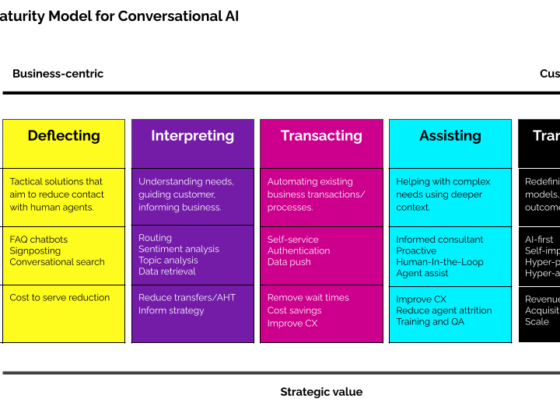Google has announced its very own contact centre as a service in partnership with ujet.
Google will white label the ujet cloud contact centre solution to provide enterprises with an integrated CCaaS and AI offer.
It’s labelled it CCAI, which is simply an extension of its current CCAI bundle, which so far includes DialogFlow for AI assistants, Agent Assist for, well, agent assist(!) and Insights for analysis.
This gives Google one of the few AI-native CCaaS offerings out there, and at Google’s scale, you can’t help but think it’ll have success.
But it won’t come without a fight.
Competition
Google’s biggest cloud competitors are already in the CCaaS market. Amazon, as you know, has Amazon Connect, it’s CCaaS offering. And Microsoft recently announced a CCaaScomponent to Dynamics 365.
So making a move like this makes total sense, and it’s been on the cards.
Google’s old partners are now competitors
But this isn’t the only competition there is. It will also face stiff competition from some of its CCAI partners – those already leading the charge in CCaaS capabilities. Companies like Genesys, Avaya, TalkDesk, Five9, Cisco and others. All of whom have been Google’s CCAI partners so far.
Quite how those companies will feel now is open for debate, though I suspect they’re feeling sore.
The thing is, though, the writing has been on the wall. This is typical behaviour from a large tech giant: investigate a market, establish relationships with the key players, figure out how to play and then introduce a competitive product. This is text book Amazon.
Why would Google sacrifice its existing CCaaS partnerships?
Google CCAI partnerships weren’t actually working that well for Google, to be honest. Google won’t tell you this directly, but they weren’t.
For example, Genesys has its own AI capabilities which, although basic in comparison to DialogFlow, still incentivises Genesys to keep AI requirements in house. Why hand an AI project to Google when they can deliver it themselves (or at least try)? With its Bold360 acquisition, it now has much better capabilities and talent than it did prior.
The same can be said for the other players: Five9 acquired Inference to give itself AI capabilities. Cisco acquired MindMeld. Avaya has some capabilities from its acquisition of Spoken Communications.
Get it? All of the leading CCaaS players are bringing on board their own conversational AI capabilities. Partnering with Google was nothing more than a tick box to keep up with the Joneses.
Google’s new partnership strategy
And Google learned this. That’s why there hasn’t been a huge amount of activations from those partnerships. That’s why Google is now partnering with SIs and BPOs: companies with clients and without their own AI capabilities.
Google introducing its own CCaaS will make this new partnership strategy even more attractive to its system integrator and BPO partners.
AI-first positioning
Also, leaning heavily on the AI components and positioning it as an AI-first CCaaS solution makes total sense.
While Amazon Connect inevitably has a fairly smooth integration with AWS AI capabilities, such as Lex, Kendra, Polly etc, Connect isn’t specifically marketed as an AI-first contact centre. It’s a cloud based contact centre with native AI integration capability.
Microsoft, on the other hand, pretty much positioned its contact centre offering as an AI-first product. Almost three quarters of the features it included in its press release were AI capabilities from the Azure stack.
But every other competitor to Google is a contact centre-first company. And most of them have a pretty large on-prem client base. Therefore, many are perceived to be ‘traditional’ comms companies. If there’s one thing that Google isn’t, it’s traditional.
So who else would you trust to provide AI-first CCaaS solution?
Why ujet?
Finally, some words about ujet. Google honestly couldn’t have picked a better partner.
Ujet has a different way of approaching CX and contact centres in general. It’s mobile-first, omni-channel native and prides itself on being the contact centre of the future.
Ujet has had a fairly long standing partnership with Google in other areas in the past, but making this official is a huge deal for CEO Anand Janefalkar and his team.
Don’t be surprised if Google acquires ujet in future.
Exciting developments indeed.




